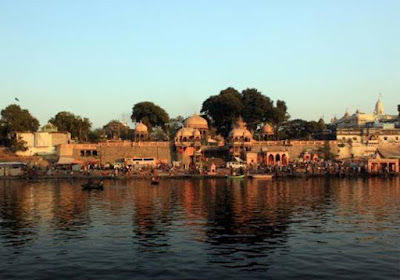Sipra River
The Skanda Purana says that the banks of the Sipra River were made sacred by the hermitages of reputed sages. For example, the ashrama of Sandipani Muni, where Lord Krishna and Lord Balarama received education, was in the city Avantipura, which stood on the banks of the Sipra. The ancient ruins of Avantipura are about a mile from the city of Ujjain.Ujjain is one of India's seven mukti-puris, or places that grant liberation. The others are Ayodhya, Mathura, Haridwar, Kasi, Kanchi and Dwaraka. Every year on the full-moon day of the month of Kartika, a fair is held in Ujjain. And every twelve years, when Jupiter is in the sign of Scorpio, Ujjain holds a Kumbha Mela.The Srimad-Bhagavatam (11.23) tells the following story of a mendicant sannyasi from Avantipura to exemplify how one should tolerate the disturbances and offenses created by evil persons:The harsh words of uncouth persons pierce the heart even more severely than arrows. Yet the mendicant brahmana from the city of Avanti, even while being attacked by a weak man, considered this trouble to be simply the consequence of his own past deeds and tolerated it with the utmost sobriety. Previously the brahmana had been an agriculturalist and merchant. He had been extremely greedy, miserly and prone to anger. As a result, his wife, sons, daughters, relatives and servants were all deprived of every kind of enjoyment and gradually came to behave unaffectionately toward him. In due course of time, thieves, family members and providence took away the sum total of his wealth. Finding himself without any property and abandoned by everyone, the brahmana developed a deep sense of renunciation.He considered how the earning and preservation of wealth involve great effort, fear, anxiety and confusion. Because of wealth, there arise fifteen unwanted itemsthievery, violence, lying, deception, lust, anger, pride, feverishness, disagreement, hatred, distrust, conflict, attachment to women, gambling and intoxication. When this meditation arose in his heart, the brahmana could understand that the Supreme Lord Sri Hari had somehow become satisfied with him.
He felt that the apparently unfavourable turn of events in his life had occurred only because the Lord was pleased with him. He was grateful that a sense of detachment had arisen in his heart and considered it the factual means for delivering his soul. In this condition he determined to engage the duration of his life in the worship of Lord Hari and thus accepted the mendicant order of tridandi-sannyasa. Subsequently, he would enter different villages to beg charity, but the people would harass and disturb him. But he simply tolerated all this, remaining firm as a mountain. He remained fixed in his chosen spiritual practice and sang a song renowned as the Bhiksu-gita.Neither moral persons, the demigods, the soul, the ruling planets, the reactions of work nor time are the causes of one's happiness and distress. Rather, the mind alone is their cause, because it is the mind that makes the spirit soul wander in the circle of material life. The real purpose of all charity, rehgiosity, and so forth is to bring the mind under the control. A person who has already composed his mind in meditation has no need for these other processes, and for a person who is incapable of fixing his mind they are of no practical use. The false conception of material ego binds the transcendental soul to material sense objects. The Avanti brahmana therefore became determined to bring himself over the insurmountable ocean of material existence by rendering service to the lotus feet of the Supreme Lord, Mukunda, with the same perfect faith in the Lord exhibited by the great devotees of the past. Only when one can focus his intelligence on the lotus feet of the Supreme Personality of Godhead can the mind be completely subdued; this is the essence of all prescriptions for spiritual advancement.
He felt that the apparently unfavourable turn of events in his life had occurred only because the Lord was pleased with him. He was grateful that a sense of detachment had arisen in his heart and considered it the factual means for delivering his soul. In this condition he determined to engage the duration of his life in the worship of Lord Hari and thus accepted the mendicant order of tridandi-sannyasa. Subsequently, he would enter different villages to beg charity, but the people would harass and disturb him. But he simply tolerated all this, remaining firm as a mountain. He remained fixed in his chosen spiritual practice and sang a song renowned as the Bhiksu-gita.Neither moral persons, the demigods, the soul, the ruling planets, the reactions of work nor time are the causes of one's happiness and distress. Rather, the mind alone is their cause, because it is the mind that makes the spirit soul wander in the circle of material life. The real purpose of all charity, rehgiosity, and so forth is to bring the mind under the control. A person who has already composed his mind in meditation has no need for these other processes, and for a person who is incapable of fixing his mind they are of no practical use. The false conception of material ego binds the transcendental soul to material sense objects. The Avanti brahmana therefore became determined to bring himself over the insurmountable ocean of material existence by rendering service to the lotus feet of the Supreme Lord, Mukunda, with the same perfect faith in the Lord exhibited by the great devotees of the past. Only when one can focus his intelligence on the lotus feet of the Supreme Personality of Godhead can the mind be completely subdued; this is the essence of all prescriptions for spiritual advancement.



Comments
Post a Comment